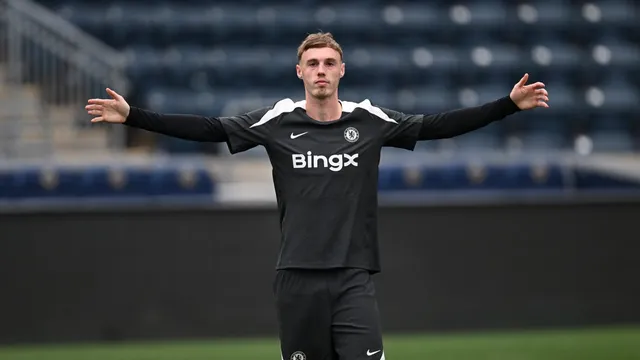
Chelsea secures solid win against LAFC in Club World Cup opener
2025-06-17 06:37- Chelsea achieved a 2-0 victory over Los Angeles FC during their Club World Cup opener in Atlanta.
- The match saw only 22,137 fans in attendance at the 71,000-capacity stadium, attributing to a weekday afternoon kickoff.
- Chelsea's win positions them well in Group D as they aim for success in the prestigious tournament.
Express your sentiment!
Insights
In the United States on June 16, 2025, Chelsea began their Club World Cup campaign with a decisive 2-0 victory over Los Angeles FC at the Mercedes-Benz Stadium in Atlanta. However, the match was marred by a dismal turnout, with only 22,137 fans attending a venue that can hold 71,000. The low attendance is attributed to the match being held at 3:00 PM local time on a weekday, making it difficult for many local fans to attend. Despite the poor crowd, Chelsea took advantage of the situation and delivered a strong performance to secure three points in their opening game of the tournament. During the match, Chelsea controlled the pace from the outset, and their persistence paid off with goals from Pedro Neto and Enzo Fernandez. The team's performance was highlighted by solid defensive showing led by goalkeeper Robert Sanchez, who made crucial saves to keep LAFC at bay. In the 32nd minute, Neto broke the deadlock, taking a well-placed pass from Nicolas Jackson and scoring his first goal of the tournament. This set the tone for Chelsea, who appeared confident and composed throughout the first half. The second half saw the introduction of new signing Liam Delap, who made his Chelsea debut as a substitute. Delap's impact was immediate, and he assisted Fernandez, who scored Chelsea's second goal in the 79th minute. LAFC, despite having former Chelsea striker Olivier Giroud in their ranks, struggled to translate possession into clear-cut chances against Chelsea's defense. Their inability to finish off promising moves highlighted the quality gap between the two teams on the day. Chelsea's victory not only boosted their position in Group D but also raised concerns about the event's attendance and atmosphere. The largely empty stadium prompted coach Enzo Maresca to comment on the unusual environment, which could impact players' performances in the tournament. With Chelsea facing Brazilian club Flamengo next, concerns remain regarding attendance figures and the overall energy surrounding the tournament. Maresca expressed hope for a better turnout in the upcoming match, eyeing an opportunity to build momentum as his team seeks to reclaim elite status on the international stage after recent successes in domestic and European competitions.
Contexts
The impact of scheduling on sports attendance has become a crucial topic of investigation for sports organizations, teams, and researchers alike. This phenomenon encompasses various aspects, including timing, competition with other events, and the effects of media coverage. A well-structured schedule can maximize attendance by catering to fan preferences and minimizing conflicts with significant local or national activities. Moreover, timing factors such as day of the week and time of day significantly influence fan availability, which in turn affects ticket sales and overall attendance figures. Events scheduled on weekends or during holidays tend to attract larger crowds compared to midweek games, where attendance numbers are generally lower due to work commitments and general social patterns. Understanding these trends is essential for teams aiming to enhance their fan engagement and revenue generation through strategic scheduling. Furthermore, the impact of competing events cannot be understated. Cities often host multiple events simultaneously, such as concerts, festivals, or rival sporting events, which can split the fan base and lead to decreased attendance at a scheduled game. By analyzing local event calendars and establishing partnerships with event organizers, sports teams can better position themselves to avoid scheduling conflicts that might detract from their audience. Research indicates that teams that strategically communicate their event dates and manage conflicts tend to foster stronger relationships with their fan base, encouraging loyalty and repeat attendance. Marketing strategies that highlight local attractions or unique experiences tied to a particular game can also play a pivotal role in driving ticket sales and attendance. Moreover, the influence of media coverage on attendance is increasingly significant in the digital age. The rise of streaming platforms and televised coverage has altered how fans engage with sports, as many fans opt to watch games from the comfort of their homes rather than attending in person. This is particularly relevant for major leagues where broadcast deals provide teams with significant revenue, but it can also lead to declining gate revenue if not properly managed. Teams increasingly leverage social media and other digital marketing avenues to create excitement around games, emphasizing the in-stadium experience and the benefits of attending vs. watching at home. These strategies often include promotional offers, fan events, and enhanced game-day experiences that can entice fans to choose attending live events over alternative viewing options. In conclusion, sports attendance is tightly interwoven with the intricacies of scheduling, competition, and media influence. Organizations that prioritize understanding these dynamics can create schedules that not only accommodate the preferences of their fans but also reduce the potential for missed opportunities due to competing events or viewing options. A proactive approach in managing these aspects can lead to improved attendance figures, enhanced fan experiences, and ultimately greater financial stability for sports franchises. As the sporting landscape continues to evolve, so too must scheduling strategies in order to adapt to the changing preferences and behaviors of the audience.